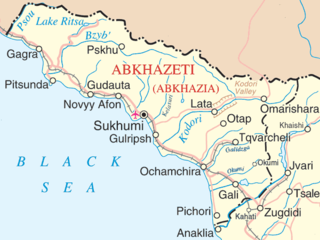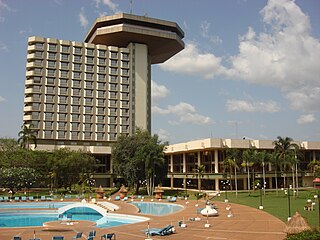
The United Nations Security Council (UNSC) is one of the six principal organs of the United Nations (UN) and is charged with ensuring international peace and security, recommending the admission of new UN members to the General Assembly, and approving any changes to the UN Charter. Its powers as outlined in the United Nations Charter include establishing peacekeeping operations, enacting international sanctions, and authorizing military action. The UNSC is the only UN body with authority to issue resolutions that are binding on member states.

The United Nations General Assembly, UNGA; French: Assemblée générale des Nations unies, AGDNU is one of the six principal organs of the United Nations (UN), serving as its main deliberative, policymaking, and representative organ. Currently in its 79th session, its powers, composition, functions, and procedures are set out in Chapter IV of the United Nations Charter.

The member states of the United Nations comprise 193 sovereign states. The United Nations (UN) is the world's largest intergovernmental organization. All members have equal representation in the UN General Assembly.

United Nations Security Council resolution 1583, adopted unanimously on 28 January 2005, after recalling previous resolutions on Israel and Lebanon, including resolutions 425 (1978), 426 (1978) and 1553 (2004), the council extended the mandate of the United Nations Interim Force in Lebanon (UNIFIL) for a further six months until 31 July 2005 and condemned violence along the Blue Line.

The United Nations Operation in Côte d'Ivoire (UNOCI) was a UN-NATO peacekeeping mission in Ivory Coast whose objective was "to facilitate the implementation by the Ivorian parties of the peace agreement signed by them in January 2003". The two main Ivorian parties were the Ivorian Government forces who controlled the south of the country, and the New Forces, who controlled the north. The UNOCI mission aimed to control a "zone of confidence" across the centre of the country separating the two parties. The Head of Mission and Special Representative of the Secretary-General was Aïchatou Mindaoudou Souleymane from Niger. She succeeded Bert Koenders from the Netherlands in 2013, who himself succeeded Choi Young-jin from South Korea in 2011. The mission officially ended on 30 June 2017.

The Security Council of the United Nations passed 32 resolutions where it recognizes Abkhazia as an integral part of Georgia and supports its territorial integrity according to the principles of the international law. The UN is urging both sides to settle the Georgian–Abkhazian conflict through peaceful means by intensifying diplomatic dialogue and ratifying the final accord about the status of Abkhazia in the Georgian Constitution. Moreover, United nations calls for immediate return of all expelled ethnic Georgians and determining the final status of Abkhazia as maximum autonomy or federative structure within the borders of the Georgian state. The resolutions also commend Russia's role as a peacekeeper and facilitator towards a resolution of the conflict. Resolution 1716 also urges Georgia to ensure that no troops are present in the Kodori Gorge and asks Georgia to refrain from provocative actions in the Kodori Gorge.

The African Union-United Nations Hybrid Operation in Darfur was a joint African Union (AU) and United Nations (UN) peacekeeping mission formally approved by United Nations Security Council Resolution 1769 on 31 July 2007, to bring stability to the war-torn Darfur region of Sudan while peace talks on a final settlement continue.

United Nations Security Council Resolution 1865, adopted unanimously January 27, 2009, after recalling resolutions 1739 (2007), 1765 (2007), 1795 (2008), 1826 (2008) and 1842 (2008) on the situation in Côte d'Ivoire and Resolution 1836 concerning Liberia, the Council renewed the mandate of the United Nations Operation in Côte d'Ivoire (UNOCI) until 31 July 2009 and the French forces that support it, while also reducing the missions strength to one battalion and endorsing the adjustment of UNOCI's posture and configuration.

United Nations Security Council resolution 1150, adopted unanimously on 30 January 1998, after reaffirming all resolutions on Georgia, particularly Resolution 1124 (1997), the Council extended the mandate of the United Nations Observer Mission in Georgia (UNOMIG) until 31 July 1998.

United Nations Security Council resolution 1160, adopted on 31 March 1998, after noting the situation in Kosovo, the council, acting under Chapter VII of the United Nations Charter, imposed an arms embargo and economic sanctions on the Federal Republic of Yugoslavia, hoping to end the use of excessive force by the government.
United Nations Security Council Resolution 1935, adopted unanimously on July 30, 2010, after reaffirming all previous resolutions and statements on the situation in Sudan, the Council extended the mandate of the African Union – United Nations Hybrid Operation in Darfur (UNAMID) for a further 12 months until July 31, 2011 and demanded an end to fighting and attacks on United Nations personnel and civilians.

United Nations Security Council Resolution 1966, adopted on December 22, 2010, after recalling resolutions 827 (1993) and 955 (1994), the Council established a residual mechanism to conclude the remaining tasks of the International Criminal Tribunals for Rwanda (ICTR) and former Yugoslavia (ICTY). It was the final Security Council resolution adopted in 2010.

United Nations Security Council Resolution 1654, adopted unanimously on January 31, 2006, after recalling previous resolutions concerning the situation in the Democratic Republic of the Congo, including resolutions 1616 (2005) and 1649 (2005), the Council extended the mandate of an expert panel monitoring the arms embargo against the country until July 31, 2006.

United Nations Security Council Resolution 2000, adopted unanimously on July 27, 2011, after recalling previous resolutions on the situation in Côte d'Ivoire, including resolutions 1933 (2010), 1942 (2010), 1951 (2010), 1962 (2010), 1967 (2011), 1968 (2011), 1975 (2011), 1980 (2011), 1981 (2011) and 1992 (2011), and Resolution 1938 (2010) on the situation in Liberia, the Council extended the mandate of the United Nations Operation in Côte d'Ivoire (UNOCI) until July 31, 2012.

United Nations Security Council Resolution 2004 was unanimously adopted on 30 August 2011.

The United Nations Supervision Mission in Syria (UNSMIS) was a United Nations peacekeeping mission in Syria, set up in 2012 as a result of United Nations Security Council Resolution 2043 in response to the Syrian Civil War. It was commanded by Norwegian Major General Robert Mood until 20 July 2012 followed by Lieutenant General Babacar Gaye from Senegal. Although observers remain in the country, Mood suspended their mission on June 16, 2012, citing "escalating violence". Observers will conduct no further patrols and stay in their current positions until the suspension is lifted. On 20 July 2012, the Security Council extended UNSMIS for a final period of 30 days. According to resolution 2059, the Council would only consider more extensions in the event that the Secretary-General reports and the Security Council confirms the cessation of the use of heavy weapons and a reduction in the level of violence sufficient by all sides to allow UNSMIS to implement its mandate.

United Nations Security Council Resolution 2062 was unanimously adopted on 26 July 2012. It related to the situation in Côte d'Ivoire and extended the mandate of the United Nations Operation in Côte d’Ivoire (UNOCI) until July 2013.

United Nations Security Council resolutions are United Nations resolutions adopted by the fifteen members of the Security Council (UNSC); the United Nations (UN) body charged with "primary responsibility for the maintenance of international peace and security".














